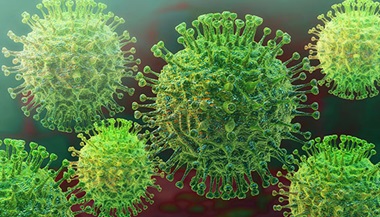Long COVID: Long-Term Effects of COVID-19
Featured Experts:
Mild or moderate COVID-19 lasts about two weeks for most people. But in some others, long-term effects of COVID-19 can cause lingering health problems and wreak havoc for months.
Tae Chung, M.D., a specialist in neurology and physical medicine and rehabilitation; Megan Hosey, Ph.D., an expert in rehabilitation psychology; Arun Venkatesan, M.D., Ph.D., a specialist in neurology; Amanda Morrow, M.D., an expert in pediatric rehabilitation medicine; and Ann M. Parker, M.D., Ph.D., who specializes in lung disease and critical care, discuss long-term COVID-19, what symptoms are most common and what those affected by them can expect.
How long does COVID last?
Mild or moderate COVID-19 lasts about two weeks for most people. But others experience lingering health problems even after the fever and cough go away and they are no longer testing positive for the illness.
Parker notes that the World Health Organization has developed a definition for post-COVID-19 condition (the WHO’s term for long COVID) as coronavirus symptoms that persist or return three months after a person becomes ill from infection with SARS CoV-2, the coronavirus that causes COVID-19. Those symptoms can include:
- Fatigue
- Shortness of breath
- Cognitive problems (thinking and memory)
The symptoms can come and go, but have an impact on the person’s everyday functioning, and cannot be explained by another health problem.
What causes post-COVID syndrome?
While it’s clear that people with certain risk factors (including high blood pressure, smoking, diabetes, obesity and other conditions) are more likely to have a serious bout of COVID-19, there isn’t a clear link between these risk factors and long-term problems. In fact, long COVID can happen in people who have mild symptoms, although patients with more severe initial illness seem to be more likely to have long-term impairments.
More studies will shed light on why these stubborn health problems persist in some people.
What causes symptoms in COVID long haulers?
SARS-CoV-2 can attack the body in a range of ways, causing damage to the lungs, heart, nervous system, kidneys, liver and other organs. Mental health problems can arise from grief and loss, unresolved pain or fatigue, or from post-traumatic stress disorder (PTSD) after treatment in the intensive care unit (ICU).
Doctors are seeing a spectrum of symptoms after acute COVID-19, some of which would be expected after other critical illnesses. Some are minor, but other people may need continuing care and even readmission to the hospital.
Similar, lingering problems can affect patients with other serious illnesses. But it is notable that post-COVID-19 syndrome is not just afflicting people who were very sick with the coronavirus: Some patients who were never severely ill with COVID-19 are experiencing long-term symptoms.
Do COVID vaccines prevent long COVID?
Getting vaccinated for COVID-19 lowers the risks of COVID infection. While breakthrough infections are possible, being fully vaccinated and boosted is effective in reducing the risk of hospitalization and death due to COVID. Research is ongoing about how long COVID affects people who had breakthrough COVID, but it is likely that being vaccinated reduces the risk.
Breathing Issues after COVID-19
A bad case of COVID-19 can produce scarring and other permanent problems in the lungs, but even mild infections can cause persistent shortness of breath — getting winded easily after even light exertion.
Lung recovery after COVID-19 is possible, but takes time. Experts say it can take months for a person’s lung function to return to pre-COVID-19 levels. Breathing exercises and respiratory therapy can help.
Heart Problems in COVID Long Haulers
SARS-CoV-2 infection can leave some people with heart problems, including inflammation of the heart muscle. In fact, one study showed that 60% of people who recovered from COVID-19 had signs of ongoing heart inflammation, which could lead to the common symptoms of shortness of breath, palpitations and rapid heartbeat. This inflammation appeared even in those who had had a mild case of COVID-19 and who had no medical issues before they got sick.
Kidney Damage from COVID-19
If the coronavirus infection caused kidney damage, this can raise the risk of long-term kidney disease and the need for dialysis.
Loss of Taste and Smell after COVID-19
The senses of smell and taste are related, and because the coronavirus can affect cells in the nose, having COVID-19 can result in lost or distorted senses of smell (anosmia) or taste. Before and after people become ill with COVID-19, they might lose their sense of smell or taste entirely, or find that familiar things smell or taste bad, strange or different.
For about a quarter of people with COVID-19 who have one or both of these symptoms, the problem resolves in a couple of weeks. But for most, these symptoms persist. Though not life-threatening, prolonged distortion of these senses can be devastating and can lead to lack of appetite, anxiety and depression. Some studies suggest that there’s a 60% to 80% chance that these people will see improvement in their sense of smell within a year.
Neurologic Problems in Long COVID
Neurologist Arun Venkatesan, M.D., Ph.D., says, “Some individuals develop medium to long-term symptoms following COVID infection, including brain fog, fatigue, headaches and dizziness. The cause of these symptoms is unclear but is an active area of investigation.”
Cognitive Problems and Mental Health after COVID-19
Can COVID-19 increase a person’s risk for anxiety, depression and cognitive issues? A study of COVID-19’s impact on mental and emotional well-being conducted by Johns Hopkins experts in psychiatry, cognition (thinking, reasoning and remembering) and mental health found that these problems were common among a diverse sample of COVID-19 survivors.
Cognitive impairment after acute coronavirus infection can have a severe impact on a person’s life. Long-haul COVID patients may experience changes in the way they think, concentrate, speak and remember, and these symptoms can affect their ability to work or even maintain activities of daily living.
After recovering from the coronavirus, some people are left with lingering anxiety, depression and other post-COVID mental health issues. Physical changes such as pain and weakness can be complicated by long periods of isolation, stress from job loss and financial difficulties, and grief from the deaths of loved ones and the loss of good health.
Post-Intensive Care Syndrome
Patients who were hospitalized for COVID-19 treatment have a particularly challenging recovery. Experts note that post-intensive care syndrome, or PICS, puts COVID-19 survivors and other people who have spent time in the ICU at a higher risk for problems with mental health, cognition and physical recovery.
Megan Hosey, Ph.D., a rehabilitation psychologist, says that prolonged time in the ICU can cause delirium. The strange surroundings, multiple mind-altering medications, isolation and loss of control can leave patients with lasting and recurrent sensations of terror or dread, including post-traumatic stress disorder (PTSD).
“Many patients have hallucinations where they believe that medical providers are trying to harm them,” Hosey says. “We've had patients tell us things like ‘I thought I was being buried alive’ when they were being put into an MRI.”
Learn more about depression and anxiety associated with COVID-19.
POTS and Insomnia after COVID-19
Postural orthostatic tachycardia syndrome, or POTS, is a condition that affects blood circulation, and people who have survived COVID-19 may be more vulnerable to it. Tae Chung, M.D., who specializes in physical medicine and rehabilitation, says “POTS can leave survivors with other neurologic symptoms, including continuing headache, fatigue, brain fog, difficulties in thinking or concentrating, and insomnia.
Persistent post-COVID-19 insomnia, or “COVID-somnia” is an increasingly common complaint among COVID-19 survivors and can be a typical symptom of POTS.
Diabetes after COVID-19
The relationship between COVID-19 and diabetes, especially type 2 diabetes, is complex. Type 2 diabetes is a risk factor for serious cases of COVID-19, and some survivors of the illness seem to be developing type 2 diabetes signs after they recover from COVID-19.
Long COVID Symptoms in Children and Teens
It’s not yet known whether children who have had COVID-19 are more or less likely than adults to experience continuing symptoms. But long-term COVID-19 in children is a possibility, showing up as fatigue, headaches, difficulty with school work, mood concerns, shortness of breath and other long-hauler symptoms.
Amanda Morrow, M.D., a specialist in physical medicine and rehabilitation, is part of the multidisciplinary team at Kennedy Krieger Institute’s Pediatric Post COVID-19 Rehabilitation Clinic, which addresses lingering coronavirus symptoms in children and teens. She says it isn't clear why long COVID-19 symptoms affect some children and not others.
“We are seeing patients who are often very high-functioning, healthy children who did not have any previous illnesses or medical conditions,” she says, noting that many of the kids being treated at the clinic only had mild bouts of COVID-19.
Heart inflammation after COVID-19 is a concern, especially among young athletes returning to their sports after a mild or even asymptomatic case of the coronavirus. They should be screened for any signs of heart damage to ensure it is safe for them to resume activity.
Kids who have experienced the uncommon but serious complication of COVID-19 called multisystem inflammatory syndrome in children, or MIS-C, can be left with serious heart damage, and should be followed by a pediatric cardiologist.
Long-term COVID-19 problems challenge health care, too
Brigham says that the sheer scale of caring for patients with lingering COVID-19 symptoms is a serious challenge. She notes that clinicians saw post-viral symptoms in patients affected by two other coronavirus diseases — severe acute respiratory syndrome (SARS) and Middle East respiratory syndrome (MERS).
But, she says, outbreaks of those diseases were limited. Millions more people have had COVID-19 than SARS or MERS, so the potential problem of lingering health problems is huge, particularly in the context of the pandemic, with isolation, economic disadvantage, lack of access and changed daily routines further compounding the complexities of long-term COVID-19 care.
Long Covid | Johns Hopkins Post Acute Covid-19 Team (PACT)
People with long COVID, or “long-haulers,” are COVID-19 survivors but they have persistent symptoms such as shortness of breath, fatigue, headaches, palpitations, and impairments in mental health and cognition. At Johns Hopkins, the Post-Acute COVID-19 Team works with patients to help them return to previous life. Learn more at hopkinsmedicine.org/coronavirus/pact/.
What is the treatment for long-haul COVID?
Doctors and therapists can work with you to address symptoms. The Johns Hopkins Post-Acute COVID-19 Team (JH PACT) is a special multidisciplinary clinic to support the recovery of people who have had COVID-19, and similar clinics are emerging at other hospitals.
Breathing exercises, physical therapy, medications and other treatments appear to be helpful.
Many clinical trials are being planned to test various drugs and interventions for long-haul COVID. For example, a clinical trial on a novel immune-modulating drug will be launched for patients who developed POTS as a post-COVID syndrome (PI: Tae Chung, MD) at Johns Hopkins POTS Clinic Program in the summer of 2022. More information will be updated in Johns Hopkins websites.
How do I prevent long COVID-19?
The best way to avoid post-COVID-19 complications is to prevent infection with the coronavirus in the first place. Practicing coronavirus precautions and staying up to date with COVID-19 vaccines and boosters are effective ways to avoid getting COVID-19.
When should I see a doctor about post-COVID-19 symptoms?
Long-term COVID-19 symptoms can be similar to signs of other disease, so it is important to see your doctor and rule out other problems, such as cardiac issues or lung disease.
Don’t ignore loss of smell, depression, anxiety or insomnia, or write these off as unimportant or “all in your head.” Any symptom that interferes with your daily life is worth a call to your doctor, who can help you address these problems and improve the quality of your life.
If you experience new chest pain, difficulty breathing, bluish lips or any other sign of a life-threatening problem, call 911 or emergency services right away.
More information will emerge on long-term effects of COVID
SARS-CoV-2, the virus that causes COVID-19, was identified in December 2019. There is still a lot to learn about it, but our understanding of the virus and COVID-19 is evolving by the day.
Researchers will learn more about how and why the coronavirus affects different people in such a variety of ways, and why some people experience no symptoms at all while others have life-threatening organ damage or lasting disability. New insights will provide avenues for therapies and hope for people living with long-term COVID-19 effects.











